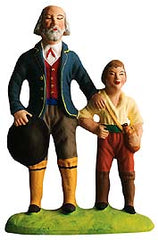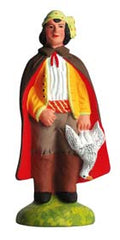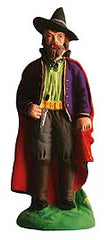Santons Prayer - Christmas Eve in Provence
The Santons Prayer quoted in the 1940s has traditionally been recited by the children of Provence as they gather around the creche after Christmas Eve supper has been celebrated. Some refer to it as the Christmas prayer of the Children of Provence.
"Little Jesus of the Crib:
Make us philosophical as the fisherman,
Carefree as the drummer,
Merry as the troubadour in exploring the world,
Eager for work as the bugler, patient as the spinner,
Kind as the ass, strong as the ox which keeps you warm.
Give us the sacred leisure of the hunter,
Give us also the desire of the shepherd for earthly things,
The pride in our work of the knife grinder and the weaver,
The song of the miller.
Grant us the knowledge of the Magi, the cheerfulness of the pigeon,
The impulsiveness of the cock, the discretion of the snail,
The meekness of the lamb. Give us the goodness of bread,
The tenderness of the wild boar, the salt of the haddock,
The good humor of old wine, the ardor of the candle,
The purity of the star.
Make us equal, dear Jesus, to our ancestors who honored you with their Christmas cribs.
Let us continue this custom while they watch over us in a Heaven which must resemble our Cribs with the Good Mother, the Infant Jesus, the angels, and these santons who are so kind they never speak an ill word of any person.
Pray, Lord, for our ancestors who passed down the Crib, for our mothers who taught us its art, for our fathers, for our homes.
We pray at your feet, Good Jesus, who wished to be born among the lowly people of this earth.
Pray for our native land, for the peace of its firesides, and for the future of our people.
Lord, pray for Provence! And upon the sea of this world, guard it as the land of your affections!"
- Foley, Little Saints of Christmas, pp. 36-37
From what Foley says, it would appear that this traditional prayer was commonly customized to include all the Santons figures in each individual family creche.
We also found this shorter version, simply cited as an Old French prayer from Provence:
"Little Jesus of the crib. Give us the virtues of those that surround you. Make us philosophical as the fisherman. Carefree as the drummer. Merry as exploring the world as the troubadour. Eager for work as the bugler. Kind as the ass. Strong as the ox that keeps you warm."
New Carbonel Santon for 2012 - The Olive Gatherer - La Ceuilleuse d'olives
Every year the Marcel Carbonel Santons workshop in Marseille creates at least one new Santon, sometimes more. 2012 brings: The Olive Gatherer - La Ceuilleuse d'olives in Size #2 - the Elite size.
We always look forward to each new figure, but this year we were, to be honest, particularly pleased with the Olive Gatherer. We imagine our delight is on several different levels. She is more than elegant, wearing a wide-brimmed black hat to shade herself from the sun over a green cotton headdress. She has a headscarf on her shoulders, a pinafore around her waist, and carries a basket of olives on her left arm, a branch of olives in that left hand, and an olive rake in the other. Another container of olives lies at her feet. The painting of her costume is, as always, exquisite.
Yet, more than that, I think she is especially appealing to those of us who are not from the French culture, as she symbolizes the harvesting of the glorious olive trees and in turn the pressing of those olives into olive oil, that we, as foreigners automatically and rather romantically associate with Provence. Provence is known not for the quantity of its olive oils, but for their superb quality.

You may enjoy reading the books and website of Carol Drinkwater, of All Creatures Great and Small, who has "retired" to an olive farm in Provence and has written of all things olives. Her story is charming, as is Carbonel's new figure. It is hard to imagine someone not wanting to add The Olive Gatherer to their Santons collection.
The Blind Man and His Son - the No. #3 "Essential" Santon for a Provençal creche
In March 2012 we published Essential Santons for a Provençal Creche - a list of the top 20 Santons included in the creche by the Provençal people. The Blind Man and his Son - l'Aveugle et son fils (French) – L'avugle e soun fieu (Provençal) was the third most important Santon to be included in the Provençal creche and is available in all four Marcel Carbonel Santons sizes offered by My Growing Traditions.
The Santon of the Blind Man and his Son was derived from the seemingly hopeless tale of these two central figures in the Pastorale of Antoine Maurel.
Pastorales are Provençal Christmas tales that tell the story of the birth of Christ. They are presented each year by Provençal villagers and are a part of the oral history passed down from generation to generation on Christmas Eve. The Provençal nativity uniquely consists of the biblical characters in traditional biblical dress with typical Provençal village characters, in 19th century dress, who have come to the manger to celebrate Jesus' birth. Written in 1844, Maurel's Pastorale is the most famous of the pastorales and was first performed at the Cercle d'Ouvriers - Catholic Circle of Workers (to which Maurel was a member ) in Marseille.
Having lost his sight years before in grief when an older son, Chicoulet (available in all but Size #1 [Cricket] of the four Marcel Carbonel sizes offered by My Growing Traditions),
was abducted by the Highwayman - Brigand (French) (also known as the robber and often confused with a gypsy).
The Blind Man, dressed in a spencer jacket with yellow braiding, travelled to the manger with his young son Simon (Simoun). Simoun was intent that his father should in the presence of the Saviour ask for his sight to be returned.
As Daniel J. Foley explains in his 1959 Little Saints of Christmas: The Santons of Provence:
The Blind Man "became a symbol of humility and patience. He was at the manger to thank the Good Mother for consoling the sick and afflicted. He felt that the Light of the World was within him, and even though he could not see the sky and the world about him, he knew it was beautiful because God made it so. He asked not for his sight on this earth, but that he might be granted vision when he reached the next world. He hoped that the time was not far away, for in his humble faith he believed in Paradise and the angels and, though blind, he wanted to see them." - p. 18
Being rewarded for his humble heart, his sight is returned at the manger. He discovers and is reunited with Chicoulet, and at the manger the Highwayman admits that it was he that kidnapped Chicoulet.
The Old Couple - the Fourth (4th) "Essential" Santon for a Provençal Creche
In March 2012 we published Essential Santons for a Provençal Creche - a list of the top 20 Santons included in the creche by the Provençal people. The Santon figure The Old Couple - Les Vieux (French) - Li Viei (Provençaux) was the fourth most vital Santon to be included in the Provençal creche and is available in all four Marcel Carbonel Santons sizes offered by My Growing Traditions. They are also known by their first names in the Provençaux language: Grasset (the old man) and Grasseto (the old woman).
The Santon "the Old Couple" derives from the pastorale play "La Bistagne" composed by Bistagne and Gauthier and from the old "Creche-Parlante" - speaking creche. Pastorales are Provençal Christmas plays that tell the story of the birth of Christ. They are presented each year by Provençal villagers and are a part of the oral history passed down from generation to generation on Christmas Eve. The Provençal nativity uniquely consists of the biblical characters in traditional biblical dress with typical Provençal village characters, in 19th century dress, who have come to the manger to celebrate Jesus’ birth.
The Old Couple, the plump, elderly man and woman, walk slowly and with tenderness, arm-in-arm, to the crib. They wear their finest clothes to honor the Savior. She wears a white cotton headdress, with a printed scarf over her shoulders and a simple apron, both of Provençal prints. He is in his best suit and may carry a lantern to light their way. They may bring with them a variety of gifts: a wicker basket of food (containing perhaps fruit, quince, or goat cheese), dried cod, and garlic. She is slightly stooped. They are happy in their old age. They come to the manger to express their thanks for the blessings they have received, and their request is a simple one: to leave this life together as they have lived it day-in-day-out. They are important to the creche as they represent the fidelity of a couple in old age - the contentedness of two lives well-lived, entwined. Together, they embody the worthiness of life.
Snapshot in Time - Marcel Carbonel Santons Maker, New York Times 1990 article
We remember in those early years of searching on the internet, looking up Marcel Carbonel Santons and finding this New York Times article of December 23, 1990: Shopper's World; Fanciful Creche Figures of Provence.
The article spoke to us in many ways. It introduced us to the fact that the wonderful, colorful, Santons nativity figures of France are loved all over the world. "In millions of homes all over France -- and indeed, the world -- the handmade santons are an enduring part of Christmas."
Most charming of all was the description of Marcel Carbonel (1911-2003):
"One fall morning, Marcel Carbonel is seated at a workbench in his immaculate white lab coat, sculpturing a fishwife. He works with a fine-pointed instrument, painstakingly modeling the face and clothing; he's having trouble with the tiny fish she carries on a plate.
When the clay piece finally meets his standards, which could take many hours, it will be used to create a plaster mould. That original mould, in turn, will go to make production moulds, hundreds of which line the shelves of the workshop. One of them, in fact, is in use: a workman places a glob of clay between the two halves of a mould, leans forward so that his weight squeezes them together and -- voila -- a donkey. After the wear and tear of 1,000 donkeys, that mould will be broken.
(Production moulds of popular figures, such as the infant Jesus, may last only two weeks.) The donkeys will spend about 12 hours in the workshop's kilns and then move to the painters' tables. There, santons come alive as the vibrant colors are applied: the red cockscomb, the basketmaker's blue shirt, the orange tile rooftops of the villagers' homes....
Looking back over the years, Mr. Carbonel recalls worrying that his craft might die out, but he helped lead the effort to promote the santons around France and the world. 'The tradition will go on,' he declares firmly, with a glance toward his 32-year-old grandson, Philippe Renoux, an executive with the firm and himself a talented santonnier."
Marcel Carbonel earned the title Meilleur Ouvrier de France (best craftsman in France) in 1961. He created his own pigments, unique to the Carbonel Santons Workshops. He built the Marcel Carbonel Santons Workshops employing around 50 artisans, a "giant in a trade typically practiced in one-and two-person workshops." For all these reasons, and especially because he was so instrumental in celebrating the Santons' heritage of Provence, Marcel Carbonel will always be remembered.
Man in Awe - the No. #2 "Essential" Santon for a Provençal Creche
In March 2012 we published Essential Santons for a Provencal Creche - a list of the top 20 Santons included in the creche by the Provençal people. The Man in Awe – Homme Ravi or Le Ravi (French) – Lou Ravi (Provençal) was the second most vital Santon included in the Provençal creche. The Man in Awe - also referred to as the delighted one, the blissful one, awestricken, enraptured, naive, innocent, even the village idiot (in a fond and ever so nice way) - is always portrayed with arms raised to the sky, dumbfounded and overjoyed on hearing the news of Jesus' birth. The word "ravi" comes from "ravissement," meaning rapture. He may be a simple lad, but not when it comes to his ability to recognize the joyousness of the Saviour's birth.
Derived from the pastorals of the 19th century, he is a farmhand who comes to the manger with nothing more to offer than the sheer delight and wonder that he feels. He has a nightcap on his head and wears a flowery shirt or waistcoat.
He is available in all four Marcel Carbonel Santons' sizes that we offer. From left to right: Size #3, Size #2, Size #1, and Puce.
Carbonel also makes a female version: The Woman in Awe - Femme Ravie (French) - La Ravido (Provençal). There exist references to her as the Man in Awe's wife, and as Charles Galtier* notes, she appears in the same pose of "unspeakable happiness." Again, from left to right: Size #3, Size #2, Size #1, and Puce.
The final Man in Awe figure created by the Carbonel workshops, is quite special, half figure and half accessory to a Stable. Available only in Size #2, he is the Cut-Off Man in Awe, meant to set in (in fact, to hang out of) a stable window. Galtier notes that when the pair of "Delighted Ones" appear in the same creche as the Cut-Off Delighted One at the window, the latter is known as The Astonished One, l'Estouna (Provençal) or the Blissful One, lou Badin-Badau (Provençal) ."*
* Galtier, Charles. Provençal Figures. Rennes, France: Editions Ouest-France, 1996.
The Shepherd - the No. #1 "Essential" Santon for a Provençal Creche
In March 2012 we published Essential Santons for a Provencal Creche - a list of the top 20 Santons included in the creche by the Provençal people. The Shepherd - Le Berger (French) - Lou Pastre (Provençal) was the number one Santon included. It was to the Shepherd that the Angel came to announce the birth of Jesus. The Shepherd then played the pivotal role of summoning all the Provençal villagers to the manger. The importance of the Shepherd is, without a doubt, symbolized by the fact that we find so many different types in the Marcel Carbonel Santons' creche. There exist more different Santons' Shepherds than any other figure. Three of Carbonel's Shepherds: the Old Shepherd, the Young Shepherd, and the Man with a Sheep, are available in all four sizes. Both the Old and Young Shepherds wear long homespun cloaks and black hats. See them here in Size #2:
To find them in the the shop, click on the links that follow.
For the Old Shepherd: Size Puce, Size #1, Size #2, and Size #3.
For the Young Shepherd: Size Puce, Size #1, Size #2, and Size #3.
And, for the Man with a Sheep: Size Puce, Size #1, Size #2, Size #3.
Two Carbonel Shepherds (more precisely, one is a Shepherdess) are available in two different sizes: The Kneeling Shepherd and the Shepherdess with a Cape. Both bring the baby Jesus a lamb. Find them pictured below in Size #2. Click here to see The Kneeling Shepherd in the shop: Size #2 and Size #3; and Size #2 and Size #3 the Shepherdess with Cape.
Carbonel's Size #3, offers two additional figures: The Shepherd from Arles and the Shepherdess with a Lamb. Both are special, although we admit to a particular affinity for the Shepherd from Arles. 

Size Puce also offers the Shepherdess with a Lamb.
The final Shepherd in the Carbonel Collection is the Sleeping Shepherd. He misses the Angel's call to the manger, as he is fast asleep. He is, indeed, a unique character. It feels best to wait and feature him in a separate, future blog post.







































